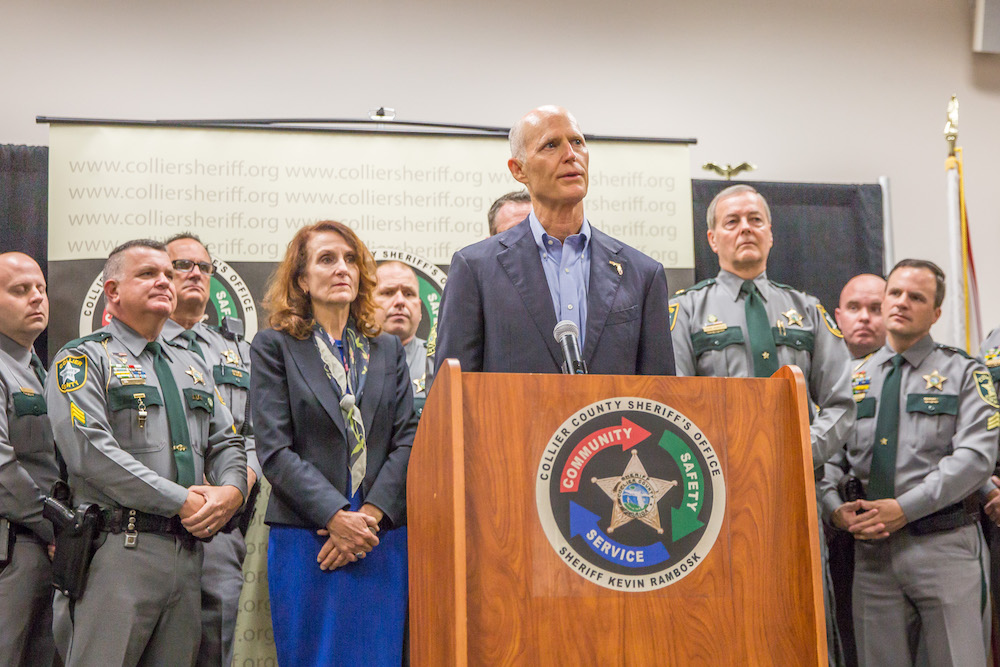
By Dara Kam
THE NEWS SERVICE OF FLORIDA
TALLAHASSEE — Metal detectors at schools, better coordination between agencies and keeping guns out of the hands of people who are mentally ill were among the solutions three groups of experts handed Tuesday to Gov. Rick Scott, as state leaders search for ways to prevent tragedies like last week’s mass shooting that killed 17 people at a Broward County high school.
Scott met with leaders from workgroups focused on education, law enforcement and mental health, seeking input for legislation he said intends to present to lawmakers on Friday, two weeks before the scheduled March 9 end of the legislative session.
“My goal is to get something accomplished. I know that we need to substantially increase funding, and I know we have to make changes if we want kids to be safe,†Scott said at the outset of the meeting.
Scott ordered the panels in response to the Wednesday massacre at Marjory Stoneman Douglas High School in Parkland, the second-worst school shooting in the nation’s history. Authorities charged 19-year-old gunman Nikolas Cruz, a former student at the school who had a lengthy history of mental-health issues, with 17 counts of premeditated murder in the deaths.
During Tuesday’s workgroup centered on security measures schools should employ, student Stephen Marante, who lives in Parkland but attends Coral Springs High School, said students want — and need — active-shooter training beginning in kindergarten. He also recommended identification badges for students, single points of entry for schools and more school resource officers, among other things, for students to feel safe.
“And kids want metal detectors. They do. I don’t know what it’s going to take. I don’t know if the money’s going to come through the state … but I don’t think the taxpayers will have a problem putting metal detectors on doors if you ask your parents how much is your child’s safety worth to you. How much are you willing to pay to have your kid come back to you?†said Marante, the student adviser to the Broward County school district.
Marante said he doesn’t care if the school “feels like prison.â€
“We need to make sure that we’re safe when we come into the building,†he said.
Scott appeared surprised to learn that, while school districts are required by law to conduct regular fire drills, they are not required to perform active-shooter training.
After the evening meeting, Scott rattled off a list of items, including the drills, he said will be included in the package he gives to legislative leaders at the end of the week.
“If you look at the things that are clear, we’ve got to have active shooter drills,†he said.
The governor also said the state needs to “significantly increase†funding for school safety and mental health and needs to figure out “how to make sure the dollars we are spending are coordinated.â€
Scott also said he wants to address the issue of people involuntarily committed under the Baker Act because of mental illness, something sheriffs said needs to be fixed.
Pinellas County Sheriff Bob Gualtieri said individuals can purchase or have access to firearms as soon as they are released after being involuntarily committed.
“You could be Baker acted 15 times in the last month, have 15 law enforcement contacts for domestic-related issues, tell a cop last night, ‘I’m going to kill my wife,’ you get Baker acted, you’re out this morning and this afternoon you’re buying a gun at a gun store in the state of Florida,†said Gualtieri, who suggested a “cooling-off†period that would require people to receive a judge’s permission to get their guns back or to purchase new firearms.
Law enforcement officials also are unable to take guns away from people who make threats of violence, the sheriff said.
That’s problematic, Scott said.
“We’ve got to figure out, if you or law enforcement see somebody that might be at risk, there should be a process, and it has to be due process, but there should be a process to make sure they don’t have access to a gun,†the governor told reporters after the meeting.
Earlier Tuesday, Scott attended the funeral of 15-year-old student Peter Wang, who reportedly died helping his fellow students escape a classroom. The governor emphasized that he intended to get legislation passed before the session ends.
“I’ve talked to families. I’ve met with families. I’ve gone to funerals. I’ve gone to hospitals. I’ve visited with students that were there,†he said. “We have to do something. We cannot continue where we are.â€
Busloads of students from the Parkland high school are expected to meet with lawmakers throughout the day Wednesday, and some early arrivals spent Tuesday roaming the halls of the Capitol to urge legislators to pass a bill that would ban assault-style weapons like the one Cruz used to kill 14 teenagers and three faculty members.
Some of the students broke down when the Republican-dominated Florida House refused to take up such a measure.
Scott praised the students for making their voices heard.
“The students are energized. They’re going to be part of this process,†the governor said, adding that “you’ve got to work hard†to get things accomplished in the legislative process.
Asked if he would sign a ban on assault weapons into law, Scott said “everything is on the table.â€
Frank Brogan, a former lieutenant governor and state education commissioner who now serves as a U.S. Department of Education assistant secretary, attended the education meeting and the evening roundtable with Scott.
Brogan applauded Scott for his quick response to the disaster.
“If something better doesn’t come out of this, all we’re going to be left with is an enormous tragedy,†Brogan said, adding that he is optimistic. “This is not just about screaming into the wind. This is about looking for real solutions.â€



